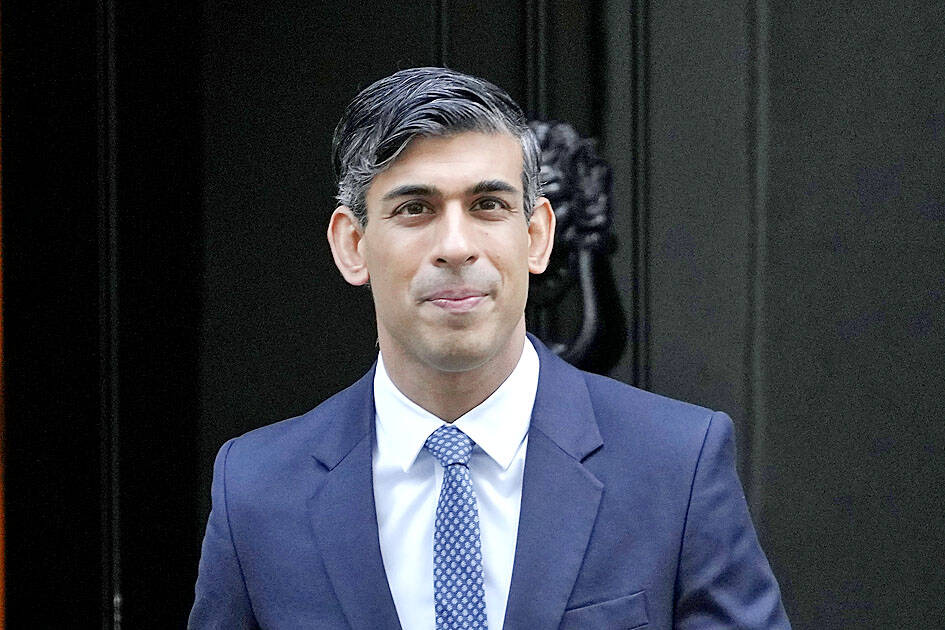The leaders of Britain and Japan were yesterday to sign a defense agreement that could see troops deployed to each others’ territory.
The two states are strengthening military ties amid growing concern about China’s increasing military assertiveness and designs toward Taiwan.
The British government said the defense agreement “cements our commitment to the Indo-Pacific” region.

Photo: AP
It was due to be signed by Japanese Prime Minister Fumio Kishida and British Prime Minister Rishi Sunak during a meeting in the symbolic setting of the Tower of London fortress.
The deal has been in the works for years, and was discussed when Kishida visited Sunak’s predecessor, former British prime minister Boris Johnson, in London in May last year.
The Reciprocal Access Agreement — Japan’s first with a European nation — allows the two to hold joint military exercises.

Photo: Reuters
The British government said it would allow the armed forces of the two G7 states “to plan and deliver larger and more complex military exercises and deployments.”
It reflects a new “Indo-Pacific tilt” in Britain’s foreign policy following the kingdom’s departure from the EU in 2020. Britain sees Japan as its key East Asian ally.
“In this increasingly competitive world, it is more important than ever that democratic societies continue to stand shoulder to shoulder as we navigate the unprecedented global challenges of our time,” Sunak said.
The two leaders were meeting at the Tower of London, a 1,000-year-old former palace and prison that houses the Crown Jewels.
Sunak’s office said they would view Japanese armor presented to King James in 1613 by Shogun Tokugawa Hidetada of Japan to mark the first-ever trade agreement between England and Japan.
Japan has joined Western nations in condemning Russia’s invasion of Ukraine and imposing sanctions against Moscow. Japan also has supplied Ukraine with helmets and other non-lethal military aid.
Japan is concerned Russia’s invasion of Ukraine could have an impact in East Asia, where China’s military has grown increasingly assertive and threatened to “unite” with Taiwan by force if necessary.
Concerned about rapid weapons advancement in China and North Korea, Japan last month adopted key security and defense reforms, including a counterstrike capability that makes a break from the self-defense-only principle it has maintained since its defeat in World War II.
Japan holds the presidency of the G7 this year, and Kishida is on a week-long trip to visit allies including Italy, France, Canada and the US, where he is due to meet US President Joe Biden at the White House tomorrow.
On Tuesday, Italian Prime Minister Giorgia Meloni and Kishida agreed at a meeting to strengthen ties in a range of spheres including the economy, trade and security, the leaders said.
“We have agreed to elevate our relations to the level of a strategic partnership,” Meloni told reporters in a brief statement after the meeting in Rome.
Among the areas of heightened cooperation Kishida cited diplomacy, investment, railways and cinema.
Additional reporting by Reuters

DEFENDING DEMOCRACY: Taiwan shares the same values as those that fought in WWII, and nations must unite to halt the expansion of a new authoritarian bloc, Lai said The government yesterday held a commemoration ceremony for Victory in Europe (V-E) Day, joining the rest of the world for the first time to mark the anniversary of the end of World War II in Europe. Taiwan honoring V-E Day signifies “our growing connections with the international community,” President William Lai (賴清德) said at a reception in Taipei on the 80th anniversary of V-E Day. One of the major lessons of World War II is that “authoritarianism and aggression lead only to slaughter, tragedy and greater inequality,” Lai said. Even more importantly, the war also taught people that “those who cherish peace cannot

STEADFAST FRIEND: The bills encourage increased Taiwan-US engagement and address China’s distortion of UN Resolution 2758 to isolate Taiwan internationally The Presidential Office yesterday thanked the US House of Representatives for unanimously passing two Taiwan-related bills highlighting its solid support for Taiwan’s democracy and global participation, and for deepening bilateral relations. One of the bills, the Taiwan Assurance Implementation Act, requires the US Department of State to periodically review its guidelines for engagement with Taiwan, and report to the US Congress on the guidelines and plans to lift self-imposed limitations on US-Taiwan engagement. The other bill is the Taiwan International Solidarity Act, which clarifies that UN Resolution 2758 does not address the issue of the representation of Taiwan or its people in

Taiwanese Olympic badminton men’s doubles gold medalist Wang Chi-lin (王齊麟) and his new partner, Chiu Hsiang-chieh (邱相榤), clinched the men’s doubles title at the Yonex Taipei Open yesterday, becoming the second Taiwanese team to win a title in the tournament. Ranked 19th in the world, the Taiwanese duo defeated Kang Min-hyuk and Ki Dong-ju of South Korea 21-18, 21-15 in a pulsating 43-minute final to clinch their first doubles title after teaming up last year. Wang, the men’s doubles gold medalist at the 2020 and 2024 Olympics, partnered with Chiu in August last year after the retirement of his teammate Lee Yang

The Philippines yesterday criticized a “high-risk” maneuver by a Chinese vessel near the disputed Scarborough Shoal (Huangyan Island, 黃岩島) in a rare incident involving warships from the two navies. The Scarborough Shoal — a triangular chain of reefs and rocks in the contested South China Sea — has been a flash point between the countries since China seized it from the Philippines in 2012. Taiwan also claims the shoal. Monday’s encounter took place approximately 11.8 nautical miles (22km) southeast” of the Scarborough Shoal, the Philippine military said, during ongoing US-Philippine military exercises that Beijing has criticized as destabilizing. “The Chinese frigate BN 554 was